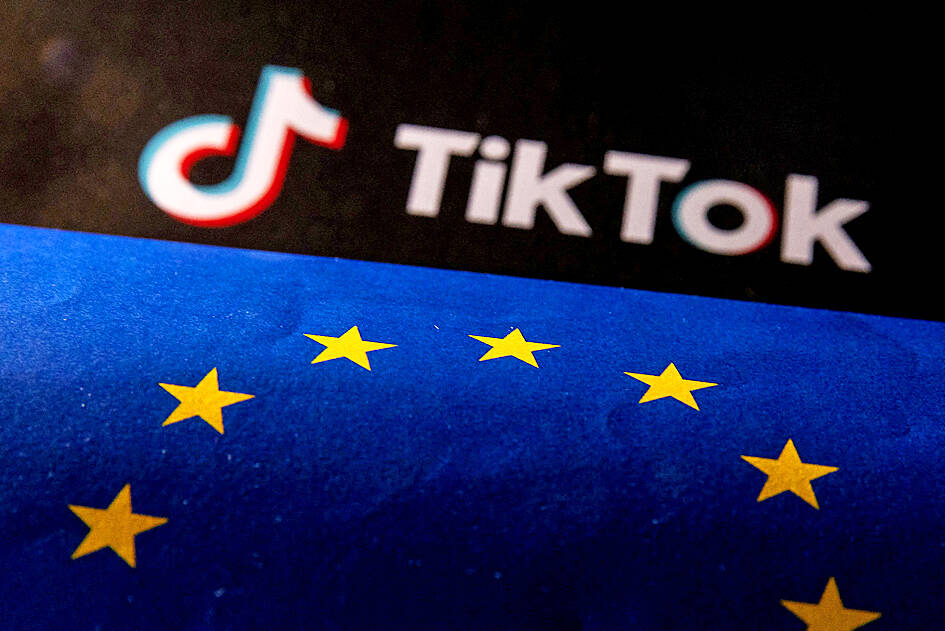TikTok owner ByteDance Ltd (字節跳動) faces the threat of hefty fines as the EU prepares a probe under its strict new content moderation rules over concerns of risks to minors.
The European Commission is to open an investigation into TikTok under the bloc’s new Digital Services Act (DSA) in the coming weeks over concerns that changes the firm made to comply with the new regulation are not enough to protect underage users, people familiar with the matter said.
This comes as ByteDance lost an EU court bid to suspend a decision by regulators to force the video-sharing social-media platform to comply with the bloc’s flagship digital antitrust rules.

Photo: Reuters
The EU’s General Court said ByteDance “has failed to demonstrate the urgency required for an interim order in order to avoid serious and irreparable damage” in an order published on Friday.
The Chinese-owned firm last year asked for interim measures alongside its appeal of the EU’s decision to put TiKTok within the scope of DSA.
If granted, this would have halted the strict scrutiny of TikTok until the outcome of the appeal.
“While we are disappointed with the decision, we look forward to having the substance of our case heard on an expedited basis,” a spokesperson for TikTok said.
The DSA gives regulators unprecedented powers to take action against major tech companies for how they handle content on their platforms. Companies face fines of as much as 6 percent of annual sales, or even risk being banned from the EU if they repeatedly break the rules.
EU regulators in December last year opened their first formal probe under the DSA into Elon Musk’s X to establish possible breaches in the way the platform handles illegal content and disinformation.
The bloc last year singled out 19 online platforms and search engines, including X, Meta Platforms Inc and Alphabet Inc, as very large — those with more than 45 million monthly active users in Europe — and has been quizzing them for information. The EU has since also added three porn sites.
The EU has sent several requests for information to TikTok since the platform was designated, enquiring among others about what steps it has taken to protect minors, especially regarding the risks to mental health and physical health, and how its services are used by children.
More investigations are likely to be added as the EU has been quizzing all designated firms for more information over the last few months. Similar to TikTok, Meta’s Instagram has also been quizzed by the EU on what changes it’s made to comply with the new rules and to assess and mitigate risks facing its underage users.

SEEKING CLARITY: Washington should not adopt measures that create uncertainties for ‘existing semiconductor investments,’ TSMC said referring to its US$165 billion in the US Taiwan Semiconductor Manufacturing Co (TSMC, 台積電) told the US that any future tariffs on Taiwanese semiconductors could reduce demand for chips and derail its pledge to increase its investment in Arizona. “New import restrictions could jeopardize current US leadership in the competitive technology industry and create uncertainties for many committed semiconductor capital projects in the US, including TSMC Arizona’s significant investment plan in Phoenix,” the chipmaker wrote in a letter to the US Department of Commerce. TSMC issued the warning in response to a solicitation for comments by the department on a possible tariff on semiconductor imports by US President Donald Trump’s

The government has launched a three-pronged strategy to attract local and international talent, aiming to position Taiwan as a new global hub following Nvidia Corp’s announcement that it has chosen Taipei as the site of its Taiwan headquarters. Nvidia cofounder and CEO Jensen Huang (黃仁勳) on Monday last week announced during his keynote speech at the Computex trade show in Taipei that the Nvidia Constellation, the company’s planned Taiwan headquarters, would be located in the Beitou-Shilin Technology Park (北投士林科技園區) in Taipei. Huang’s decision to establish a base in Taiwan is “primarily due to Taiwan’s talent pool and its strength in the semiconductor

Industrial production expanded 22.31 percent annually last month to 107.51, as increases in demand for high-performance computing (HPC) and artificial intelligence (AI) applications drove demand for locally-made chips and components. The manufacturing production index climbed 23.68 percent year-on-year to 108.37, marking the 14th consecutive month of increase, the Ministry of Economic Affairs said. In the first four months of this year, industrial and manufacturing production indices expanded 14.31 percent and 15.22 percent year-on-year, ministry data showed. The growth momentum is to extend into this month, with the manufacturing production index expected to rise between 11 percent and 15.1 percent annually, Department of Statistics

An earnings report from semiconductor giant and artificial intelligence (AI) bellwether Nvidia Corp takes center stage for Wall Street this week, as stocks hit a speed bump of worries over US federal deficits driving up Treasury yields. US equities pulled back last week after a torrid rally, as investors turned their attention to tax and spending legislation poised to swell the US government’s US$36 trillion in debt. Long-dated US Treasury yields rose amid the fiscal worries, with the 30-year yield topping 5 percent and hitting its highest level since late 2023. Stocks were dealt another blow on Friday when US President Donald